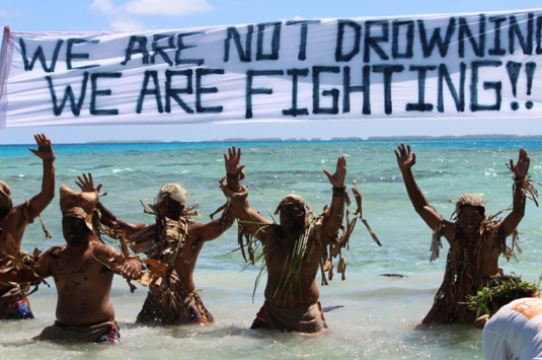I had the opportunity to develop my own course for the first time in Spring 2019, and it was the most rewarding teaching experience I have had so far. I was fortunate to work with a small group of motivated, engaged, and hardworking students who pushed my own thinking about critical issues in Oceania. The topic is based on my dissertation project, which looks at contemporary art in Oceania engaging with the colonial histories underpinning current ecological issues in the region. Because the class was relatively small (35 students), I designed the course to be half lecture and half seminar, in which students were responsible for leading the discussion every other class meeting. I was influenced by my advisor and mentor, Professor Stacy Kamehiro, who has used this format in numerous upper division courses of her own. Student responses to the course’s structure were overwhelmingly positive, and I personally learned a lot from their discussions and writing assignments.
In addition, I was able to invite a guest speaker with the generous support of the Patricia and Rowland Rebele endowment. Angela Robinson, a PhD Candidate in Gender Studies at UCLA, spoke to the class about the affective regimes of climate change in Oceania. This gave the students an opportunity to learn about these issues from somebody other than myself who approaches climate change from a Gender Studies perspective – a framework which was unfortunately less present in my syllabus. This guest lecture was early in the quarter, so the students continued to reflect on Angela Robinson’s talk as the course progressed.
This opportunity came at a crucial point in my graduate career – I passed my prospectus colloquium in Winter 2019 and was then able to develop my prospectus into a syllabus. I think this is an important step for any PhD student who wishes to enter academia after graduating. The process of developing a syllabus based on years of reading and writing for my own research was an incredibly challenging experience that forced me to hone in on the key themes of my dissertation. I came out of this experience with a much clearer idea of where my research needs to go and how I can make this topic relevant for outside audiences. The students in my course were incredibly influential in this development, and they too came away from the course with a critical understanding of these pressing issues and an appreciation for the incredible work coming out of this under-studied region.
Course description:
This course investigates the way contemporary art and visual culture inOceania reveals and resists the colonial structures of power that are the cause and consequence of ecological exploitation in the region. Through lectures, readings,and discussions,the course addresses topics such as:colonial history, militarism, urbanization, tourism, resource extraction, Indigenous relationships to place, Indigenous land rights, climate/environmental justice, activism, museum display, and more.
Student feedback:
“The design of the class worked really well, I was unsure about the discussion days at first but I think I learned a lot from talking with my peers on discussion days…I was really challenged by the readings and course material but I feel encouraged that I was able to work through it and I appreciated that the readings were not all art related so that we could make connections ourselves.”
“This has become one of my favorite HAVC classes I've ever taken at UCSC. Maggie did a great job of bringing in interesting topics and discussing them thoroughly in class.”
“Maggie's knowledge and passion for the subject shines through in her teaching. She is very clear about requirements for classes, yet cultivates an experience for students in the class that promotes engagement and discussion. I very much enjoyed the lecture one day/discussion the second day of the week structure- it was so generative and fruitful, I learned more in this class than I have in many others! …It was a very fruitful experience to have readings about broader, interdisciplinary issues and then be able to think and apply those concepts and issues to artwork shown in lecture - it was a shift away from the norm, which is usually reading readings on artworks shown in class.”


